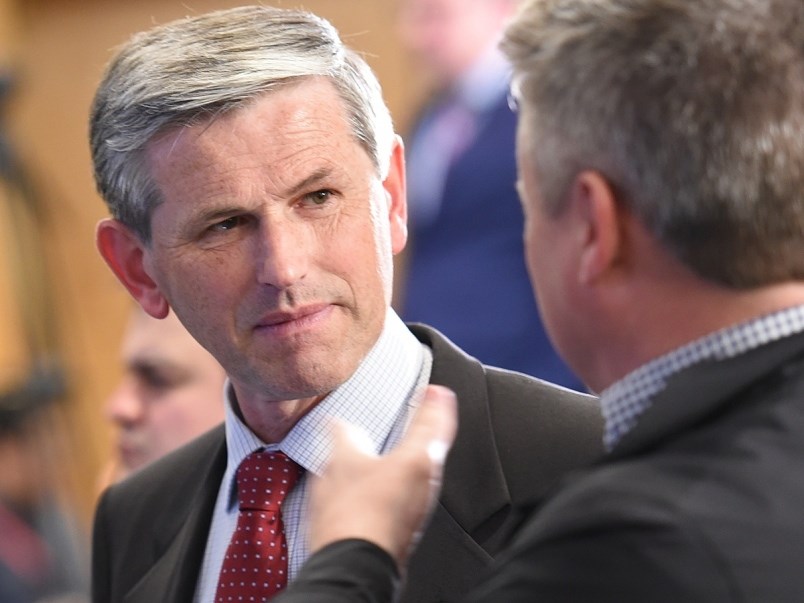 Andrew Wilkinson had a reasonably comfortable victory margin over Dianne Watts on the final ballot count of the B.C. Liberal leadership contest, getting 53 per cent to Watts’ 47.
Andrew Wilkinson had a reasonably comfortable victory margin over Dianne Watts on the final ballot count of the B.C. Liberal leadership contest, getting 53 per cent to Watts’ 47.
But he almost got wiped out in the previous count.
The lowest candidate in each round of counting dropped off the ballot. So Sam Sullivan, Mike de Jong and Todd Stone disappeared one by one as members’ second, third and fourth choices were counted and recounted during the rounds.
On the fourth round, Watts had maintained her lead, and Wilkinson and first-time MLA Michael Lee were close behind. Wilkinson was ahead of Lee by just 30 points, so Lee had to fold. With 8,700 points in play – 100 allocated to each riding – that was a close brush with oblivion.
His eventual victory was much closer than the final margin suggests. And Lee’s stubborn staying power, along with Watts’ lead almost to the end, shows Liberal members were less than enchanted with the idea of carrying on with a familiar face.
Wilkinson takes over the party knowing he was the first choice of just 18 per cent of members, and the fourth or fifth choice for many more.
After the count, Wilkinson told reporters he was delighted and pleasantly surprised to win, but instantly recognized: “I have to continue to earn this.”
“This is not a gift given to me, this is an obligation to build out this party to make sure these people feel fully committed and fully engaged.”
To make good on that, he’ll have to recognize the party’s appetite for change. In an interview with the Times Colonist editorial board the week before the vote, he touched on some of the changes in store.
He was dismissive of the party’s 2017 election campaign, saying it preached abstract financial statistics from on high, while the NDP promised cheap child care, no tolls and grants to renters.
“We suffered from being painted as a downtown elite party that didn’t care about regular people’s lives.”
So his new thrust will be to make the party kinder and gentler and more open to environmental issues, while maintaining the concept that government should leave more money in people’s pockets.
Some observations from the interview:
• ICBC – “not a file I ever touched” – needs a complete overhaul, he said. “It’s turned into this ossified, inflexible structure that needs to be completely overhauled.” Privatization is advocated by some, but Wilkinson warned them to be careful what they wish for. Private firms might not be able to match ICBC’s rates.
That puts him almost on the same page as the NDP, which will start overhauling car insurance when the legislature resumes.
• Victoria needs to concentrate on transportation planning in a big way. The building boom raises the question of whether condo-dwellers are going to walk everywhere, or want to drive to Costco and perpetuate the Colwood Crawl. It’s a boxed-in, constrained area, and nobody wants to see bigger freeways on the Island.
So does continued densification mean moving away from cars, or does the city recognize people will still travel significant distances, using car-sharing or autonomous vehicles?
“It’s probably a bad idea to start building more parking lots in the capital region, because you’re probably not going to need them as much.” Discussing the bottleneck of the Malahat between “a huge rock face and a salmon-bearing stream,” he said the options are complicated but it will likely look a lot different 20 years from now.
• Greater Victoria’s protracted argument over sewage treatment struck Wilkinson as an unfortunate way to manage municipal affairs. He noted the multiple different questions asked about amalgamation in the last municipal election and said with continued growth, it might be time to put a uniform question on the next ballot.



